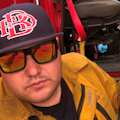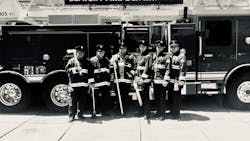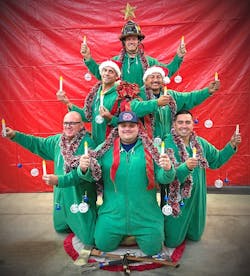“Being a company officer in these times is like herding cats.” This statement is uttered over and over in firehouses across the nation. It’s like nails on a chalkboard and must be a thing of the past. The job of a company officer can be so many things—fun, challenging, emotional, mind-numbing and extremely rewarding—but like most things in life, you get out of it what you put into it. Now, please take everything in this article with a grain of salt. Not every situation is the same. I’m just sharing what has and hasn’t worked in my short career as an officer. This article isn’t meant to be a guide to run your crew, just some helpful suggestions and starting the discussion of what makes a good officer.
Great expectations
You just were promoted, and it’s your first day as an officer. How do you communicate your expectations? Does everyone get the same speech? Are you dropping the hammer on Day One to assert your dominance? Most likely, you will be tested. How you manage that will make or break you. Like one of my favorite engineers always says, “The cons run the joint.” Your crew can make you look like a hero or a zero in every aspect of the job. Treat your crew well and take care of them, and they, in turn, will take care of you. Ultimately, the fire service is a family, right?
I don’t believe that everyone should be treated in the same way. Before you go all 2021 on me, please let me explain. Any crew consists of people from all sorts of backgrounds and experience levels. I won’t have the same expectation talk with the member who has 24 years on the job as I will with the probationary firefighter who has eight months on the job. That’s one way to tank your officer career at a young age. Someone who has 24 years of experience doesn’t need the traditional expectation speech, but rather a speech that asks them to become an historian and a mentor to the younger members. We gain a lot of knowledge and experience in this job, and it should be passed down through the generations. The probie, on the other hand, might benefit from more of a traditional conversation and from finding a mentor in a senior firefighter or engineer.
I’ve been on the receiving end of many expectation talks in my career, and I’ve given a wide range of those talks. You must decide where you fall in that range. My worst talk included a printed paper, multiple pages long, that was strict and uptight. It quoted multiple standard operating guidelines and rules in the department. It was clear to me that my assignment would be full of “by-the-book” micro-management.
My best talk lasted all of two minutes. The captain sat down and told me that his only expectation was that I was a “good roommate.” Not only did this make me feel respected for the experience that I brought to the table, it also immediately included me in that family. My approach is taking that mentality and tailoring it specifically to the individual. In return, I want to know that person’s expectations of me as an officer. What can I do to assist you in bettering yourself? Again, take care of your crew, and they will take care of you.
Working together
The fire service was built on mentorship. We must pass down knowledge and tradition through the generations, or it will be lost. We must share calls at the kitchen table. We should dissect those calls for the positives and negatives. This isn’t a place for Monday morning quarterbacking. This is a time to learn from what did and didn’t work. The nature of our job is problem-solving. If someone already saw the solution, they must share that with others. I also believe that the kitchen table discussion is a good place for the mental health aspect of the job. This is a type of debriefing for the crew that went through the call. Trust me, I know that it isn’t easy to reach out to a therapist when you need help. Sometimes, it’s easier to talk to your brothers and sisters over a cup of coffee.
Use your crew for their expertise. If someone on your crew is a subject matter expert, have that person share that knowledge through mentorship. This brings your crew together as well as lets everyone share their passion for the job.
The fire service is full of traditions. This is what makes us bond and continue to thrive. If you go to any fire station in the nation, you’ll be met with the same traditions that you have back home. The reason these are so preserved is that we continue to share them through the generations. It’s important not to lose our self-image as the fire department. The public still loves us. Kids dream of becoming us when they grow up. Not everyone gets to say that. We must teach the past but embrace the future. This career continues to change, and when we keep our traditions and work together as a family, we can get through anything that’s thrown at us.
As officers, please know that your attitude and how you carry yourself directly affects your crew. Think back to that grumpy captain who you worked for; don’t let this be you. Learn from those bad officers just as much as from the good ones. Learn how not to treat your crew. Happiness is infectious. Be something positive for your crew to have on those bad days. Be a safe place for your crew to go to when they’re having a difficult time. Sometimes, you’ll get bad assignments. Maintaining a good attitude and being positive can help to lift the spirits of your crew. If you’re burned out and miserable, how much of that will rub off onto them? Whatever you do, don’t be the officer who does miserable things just because “that’s what they did to me.”
Family is very important. I believe that crews that involve families have a much better connection. It also continues that old school tradition and thought that we all take care of each other. Families in the firehouse should be a very common and welcomed occurrence.
In this career, there are a lot of bad days. Mental health and stress are big issues with our brothers and sisters. Embrace the good days. Embrace the nights that you stay up laughing. Embrace the time that you have with your second family. Continue to learn and grow. Continue to hone your craft. Keep each other safe. Most importantly, take care of us, so we can take care of them.
About the Author

Drake Martin
Lieutenant
Drake Martin is a third-generation firefighter, currently working as the fire lieutenant on Truck 11 in the City of Benicia, CA. He started as a fire explorer in Sonoma County and worked his way up the ranks, including a few years working for CAL FIRE. Martin is a rescue swimmer, boat operator, fire investigator, medical unit leader on NBIMT, and runs the department's Fire Explorer Program. He is the founder of the Instagram comedic relief page @Almost_Truckies.

